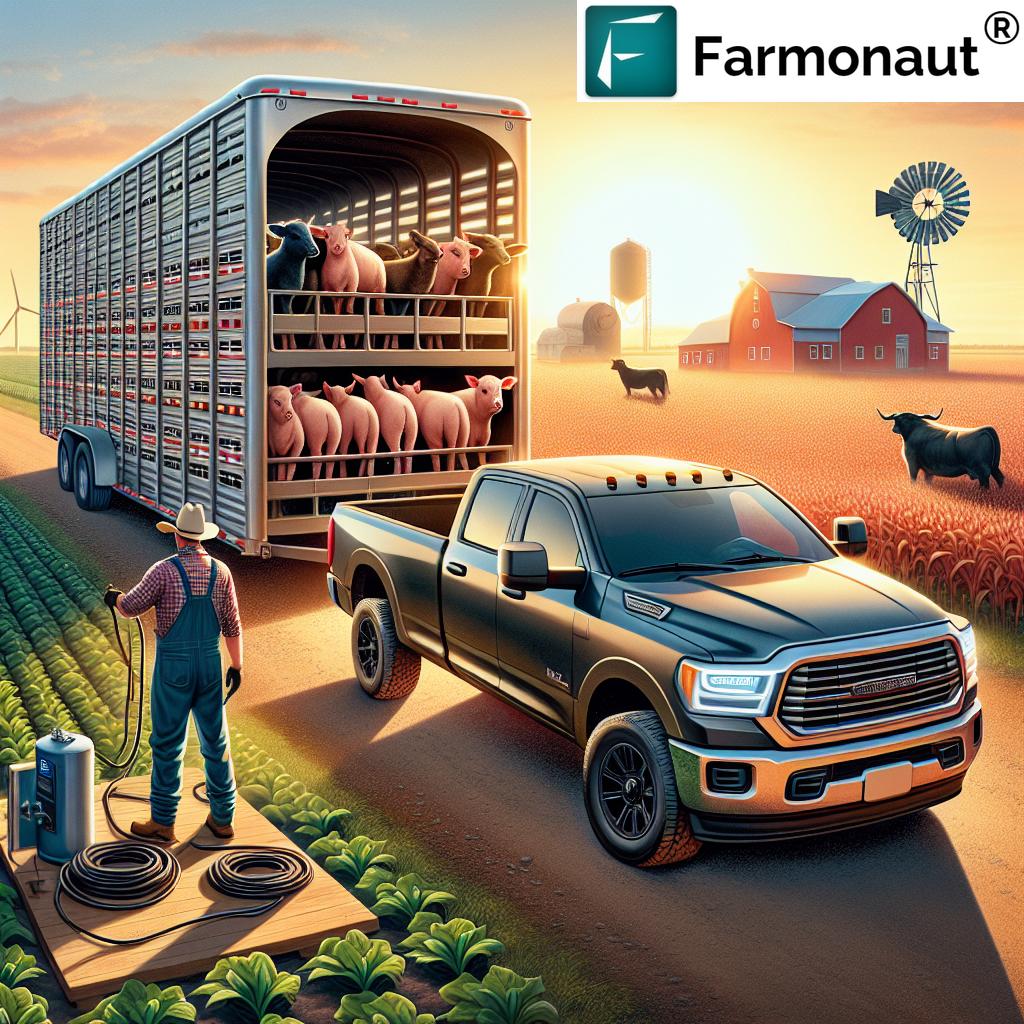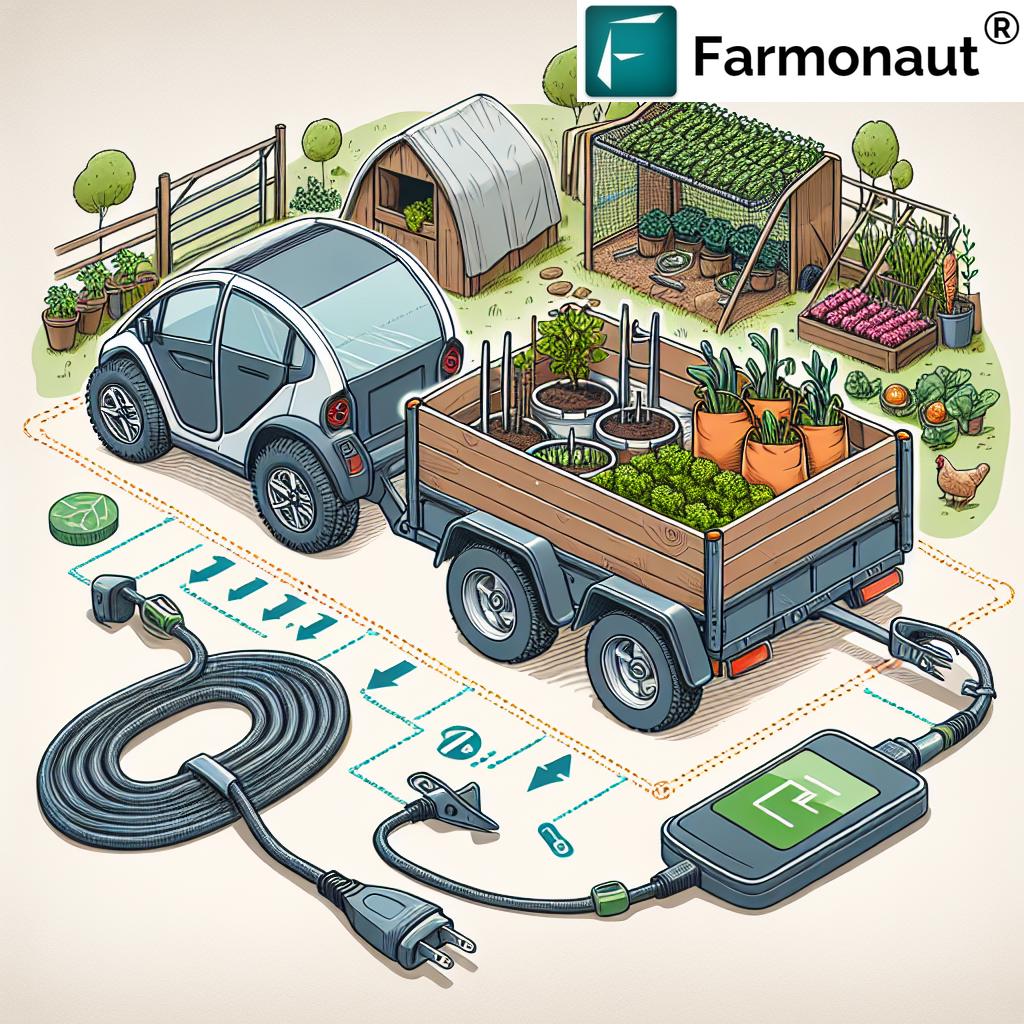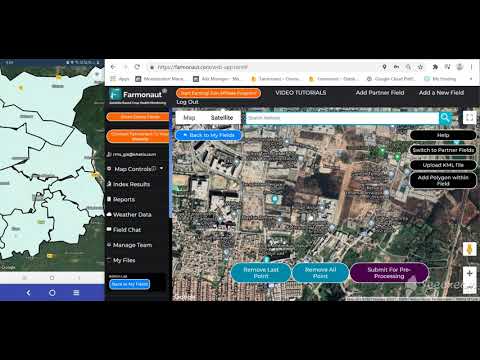The Ultimate Guide to Safe Trailer Towing for Canadian Farmers: Maximize Your Farm Vehicle’s Capacity
“Over 70% of Canadian farmers use trailers for transporting equipment, with proper weight distribution being crucial for safety.”

As Canadian farmers, we understand the importance of safe and efficient trailer towing in our daily operations. Whether we’re hauling livestock, transporting crops, or moving equipment, mastering the art of trailer towing is crucial for maximizing our farm vehicle’s capacity while ensuring safety on the road. In this comprehensive guide, we’ll explore essential tips and best practices for safe trailer towing on small farms, covering everything from determining your vehicle’s maximum towing capacity to understanding key terms like GVWR and GCWR.
Understanding Your Farm Vehicle’s Towing Capacity
Before we hitch up any trailer, it’s essential to know our farm vehicle’s towing capabilities. Here are some key points to consider:
- Maximum Towing Capacity: This is the maximum weight your vehicle can safely tow. It’s crucial not to exceed this limit to prevent damage to your vehicle and ensure safe operation.
- Gross Vehicle Weight Rating (GVWR): This is the maximum weight of your vehicle when fully loaded, including passengers, cargo, and the tongue weight of the trailer.
- Gross Combined Weight Rating (GCWR): This is the maximum weight of your fully loaded vehicle plus the fully loaded trailer.
To help you understand these concepts better, here’s a table outlining the towing capacity guidelines for common farm vehicles:
| Vehicle Type | Estimated GVWR (kg) | Estimated GCWR (kg) | Maximum Towing Capacity (kg) |
|---|---|---|---|
| Light-Duty Pickup Truck | 3,175 – 3,855 | 5,900 – 7,250 | 2,270 – 3,630 |
| Medium-Duty Pickup Truck | 3,855 – 4,535 | 7,250 – 9,070 | 3,630 – 5,440 |
| Heavy-Duty Pickup Truck | 4,535 – 6,350 | 9,070 – 14,515 | 5,440 – 9,070 |
| Compact SUV | 2,265 – 2,720 | 3,855 – 4,535 | 680 – 1,360 |
| Full-Size SUV | 3,175 – 3,855 | 5,900 – 7,250 | 2,270 – 3,630 |
| Small Tractor (30-50 HP) | 1,815 – 2,720 | 3,630 – 5,440 | 1,360 – 2,720 |
| Medium Tractor (50-100 HP) | 2,720 – 4,535 | 5,440 – 9,070 | 2,720 – 4,535 |
| Large Tractor (100+ HP) | 4,535 – 9,070+ | 9,070 – 18,140+ | 4,535 – 9,070+ |
Remember, these are estimated values, and it’s crucial to consult your vehicle’s manual or a professional for precise figures specific to your farm vehicle.
Proper Weight Distribution: The Key to Safe Towing
One of the most critical aspects of safe trailer towing is proper weight distribution. Improper weight distribution can lead to trailer sway, reduced steering control, and even accidents. Here are some trailer weight distribution tips to keep in mind:
- Aim for 60% of the cargo weight in the front half of the trailer
- Ensure the tongue weight (the downward force on the hitch) is 10-15% of the total trailer weight
- Use a weight distribution hitch for trailers over 2,270 kg (5,000 lbs)
- Distribute weight evenly from side to side
By following these guidelines, we can significantly improve the stability and handling of our towing setup, making our journeys safer and more efficient.
Secure Cargo Loading for Agricultural Trailers
Properly securing cargo is essential for safe trailer towing, especially when transporting agricultural goods or equipment. Here are some best practices for secure cargo loading:
- Use appropriate tie-downs, straps, or chains to secure items
- Distribute weight evenly across the trailer
- Use bulkheads or partitions to prevent cargo from shifting forward
- For livestock trailers, ensure proper ventilation and secure gates
- Double-check all securing mechanisms before hitting the road
Remember, improperly secured cargo can shift during transit, affecting the trailer’s stability and potentially causing accidents.
Farm Trailer Hitching Best Practices
Proper hitching is crucial for safe trailer towing. Follow these steps to ensure your trailer is securely hitched:
- Choose the right hitch class for your towing needs
- Ensure the hitch ball size matches the trailer coupler
- Connect safety chains in a criss-cross pattern
- Attach the breakaway cable (if applicable)
- Connect and test all electrical components
- Perform a final walk-around inspection before departing
By following these farm trailer hitching best practices, we can significantly reduce the risk of trailer-related accidents and ensure a safer journey for ourselves and other road users.
Towing Considerations for Electric Vehicles (EVs)
“Electric vehicles can experience up to a 50% reduction in towing range compared to their non-towing range.”
As more farmers consider transitioning to electric vehicles, it’s important to understand the unique challenges and considerations when it comes to towing with EVs. Here are some key points to keep in mind:
- Range Reduction: Towing with an EV can significantly reduce its driving range due to increased power consumption.
- Charging Planning: Plan your route carefully, considering the availability of charging stations that can accommodate a vehicle with a trailer.
- Regenerative Braking: Be aware that regenerative braking may be less effective when towing, affecting energy recovery.
- Instant Torque: EVs’ instant torque can be advantageous for initial acceleration when towing heavy loads.
- Weight Distribution: Proper weight distribution is even more critical in EVs to maintain stability and range.
As EV technology continues to advance, we can expect improvements in towing capabilities and range. However, it’s crucial to understand these current limitations when considering an EV for farm towing tasks.
Adjusting Driving Habits for Safe Trailer Towing
Towing a trailer requires adjustments to our driving habits to ensure safety. Here are some key tips:
- Increase following distance to allow for longer stopping times
- Take wider turns to accommodate the trailer’s turning radius
- Reduce speed, especially in adverse weather conditions
- Use engine braking or a lower gear when descending hills
- Be mindful of crosswinds, especially when passing large vehicles
- Avoid sudden braking or acceleration
By adapting our driving style, we can significantly improve the safety and stability of our towing setup.

Navigating Challenges: Backing Up with a Trailer
Backing up with a trailer can be one of the most challenging aspects of trailer towing. Here are some tips to master this skill:
- Place your hand at the bottom of the steering wheel
- Turn the wheel in the direction you want the trailer to go
- Make small, gradual adjustments
- Use a spotter when possible
- Practice in an open area before attempting in tight spaces
Remember, patience and practice are key to becoming proficient at backing up with a trailer.
Ensuring the Safety of Livestock and Crops During Transport
When transporting livestock or crops, additional considerations come into play to ensure their safety and well-being:
- Livestock:
- Ensure proper ventilation in the trailer
- Use appropriate bedding to prevent slipping
- Avoid overcrowding
- Make regular stops on long journeys to check on animals
- Crops:
- Use appropriate containers or bins to prevent damage
- Secure loads to prevent shifting
- Consider using tarps to protect from weather and debris
- Monitor temperature for sensitive produce
By taking these precautions, we can ensure that our valuable livestock and crops arrive at their destination safely and in good condition.
Towing Safety Guidelines for Small Farms
Small farms have unique towing needs and challenges. Here are some specific safety guidelines to keep in mind:
- Choose the right size trailer for your farm’s needs
- Regularly inspect and maintain both your towing vehicle and trailer
- Be aware of local regulations regarding farm vehicle towing
- Consider investing in a backup camera system for easier hitching and maneuvering
- Train all farm workers on proper towing procedures
By implementing these guidelines, small farm operations can ensure safe and efficient towing practices.
Towing Equipment for Various Farm Tasks
Different farm tasks require specific towing equipment. Here’s a breakdown of common towing needs and the appropriate equipment:
- Hay and Feed Transport: Flatbed trailers or specialized hay trailers
- Livestock Transport: Stock trailers with proper ventilation and secure gates
- Equipment Transport: Heavy-duty flatbed or tilt-bed trailers
- Crop Transport: Grain trailers or dump trailers
- Garden Supplies: Utility trailers for smaller loads
- Renewable Energy Equipment: Specialized trailers for solar panels or wind turbine components
Choosing the right trailer for each task ensures efficient and safe transport of farm goods and equipment.
Maintenance Tips for Safe Trailer Towing
Regular maintenance is crucial for safe trailer towing. Here are some key maintenance tasks to perform:
- Tire Pressure: Check and adjust tire pressure regularly, including the spare
- Brakes: Inspect brake pads, rotors, and brake fluid levels
- Lights: Ensure all lights and signals are functioning properly
- Bearings: Grease wheel bearings as recommended by the manufacturer
- Hitch Components: Inspect and lubricate hitch components regularly
- Suspension: Check for wear on leaf springs, shocks, and other suspension components
By staying on top of maintenance, we can prevent breakdowns and ensure our towing setup remains safe and reliable.
Leveraging Technology for Safer Towing
Modern technology can greatly enhance towing safety and efficiency. Here are some technological advancements to consider:
- Trailer Sway Control: Electronic systems that detect and mitigate trailer sway
- Backup Cameras: Makes hitching and reversing easier and safer
- Tire Pressure Monitoring Systems: Alerts you to low tire pressure in real-time
- Electronic Brake Controllers: Provides more precise control over trailer brakes
- GPS Navigation: Helps plan routes suitable for towing
While technology can greatly assist in safe towing, it’s important to remember that it doesn’t replace good judgment and proper towing practices.
For farmers looking to optimize their operations beyond towing, consider exploring advanced farm management solutions like those offered by Farmonaut. Their satellite-based crop monitoring and AI advisory systems can help improve overall farm productivity and efficiency.
Legal Considerations for Farm Vehicle Towing in Canada
Understanding and complying with legal requirements is essential for safe and lawful towing. Here are some key legal considerations for Canadian farmers:
- Ensure your driver’s license covers the weight class of your towing setup
- Be aware of provincial regulations regarding trailer brakes and safety chains
- Understand and comply with weight restrictions on roads and bridges
- Ensure your trailer registration and insurance are up to date
- Be familiar with regulations regarding the transport of livestock and agricultural products
It’s always advisable to consult with local authorities or a legal professional to ensure full compliance with all relevant regulations.
Emergency Preparedness for Trailer Towing
Being prepared for emergencies is crucial when towing a trailer. Here’s what to include in your emergency kit:
- Spare tire for both the towing vehicle and trailer
- Jack and lug wrench
- Emergency flares or reflective triangles
- Basic tool kit
- Extra fuses and light bulbs
- Tow strap or chain
- First-aid kit
Additionally, it’s wise to have a plan in place for what to do in case of a breakdown or accident while towing.
Conclusion: Mastering Safe Trailer Towing for Canadian Farmers
Safe trailer towing is a critical skill for Canadian farmers, enabling us to transport livestock, crops, equipment, and supplies efficiently and securely. By understanding our vehicle’s towing capacity, practicing proper weight distribution, securing cargo effectively, and adopting safe driving habits, we can significantly reduce the risks associated with towing.
Remember, safe towing is not just about protecting our valuable farm assets; it’s about ensuring the safety of everyone on the road. Regular maintenance, staying informed about legal requirements, and leveraging modern technology can all contribute to safer towing practices.
As we continue to adapt to changing agricultural needs and technologies, let’s prioritize safety in all aspects of our farming operations, including trailer towing. By doing so, we not only protect our livelihoods but also contribute to safer roads for all Canadians.
For more information on optimizing your farm operations, consider exploring the advanced farm management solutions offered by Farmonaut:
For developers interested in integrating farm management solutions into their own applications, check out Farmonaut’s API and API Developer Docs.
FAQ: Safe Trailer Towing for Canadian Farmers
Q: What is the most important factor in safe trailer towing?
A: Proper weight distribution is crucial for safe trailer towing. Ensuring that 60% of the cargo weight is in the front half of the trailer and maintaining the correct tongue weight (10-15% of total trailer weight) are key factors in preventing trailer sway and maintaining control.
Q: How often should I inspect my trailer before towing?
A: It’s recommended to perform a thorough inspection before each towing trip. This includes checking tire pressure, lights, brakes, hitch connections, and safety chains. Regular maintenance checks should also be conducted according to the manufacturer’s recommendations.
Q: Can I use my regular driver’s license for farm trailer towing in Canada?
A: This depends on the combined weight of your vehicle and trailer. In most provinces, a regular Class 5 license is sufficient for towing trailers up to a certain weight limit. However, for heavier loads, you may need a commercial driver’s license. Always check your provincial regulations.
Q: How do I determine the right size trailer for my farm needs?
A: Consider the type and weight of loads you’ll be hauling most frequently, as well as your towing vehicle’s capacity. It’s better to choose a trailer that slightly exceeds your typical needs to accommodate occasional larger loads. Always ensure your vehicle can safely tow the fully loaded trailer.
Q: Are there special considerations for towing with an electric vehicle on the farm?
A: Yes, when towing with an EV, be prepared for a significant reduction in driving range. Plan your routes carefully, considering charging station availability. Also, be aware that regenerative braking may be less effective when towing, which can affect energy recovery and braking performance.






